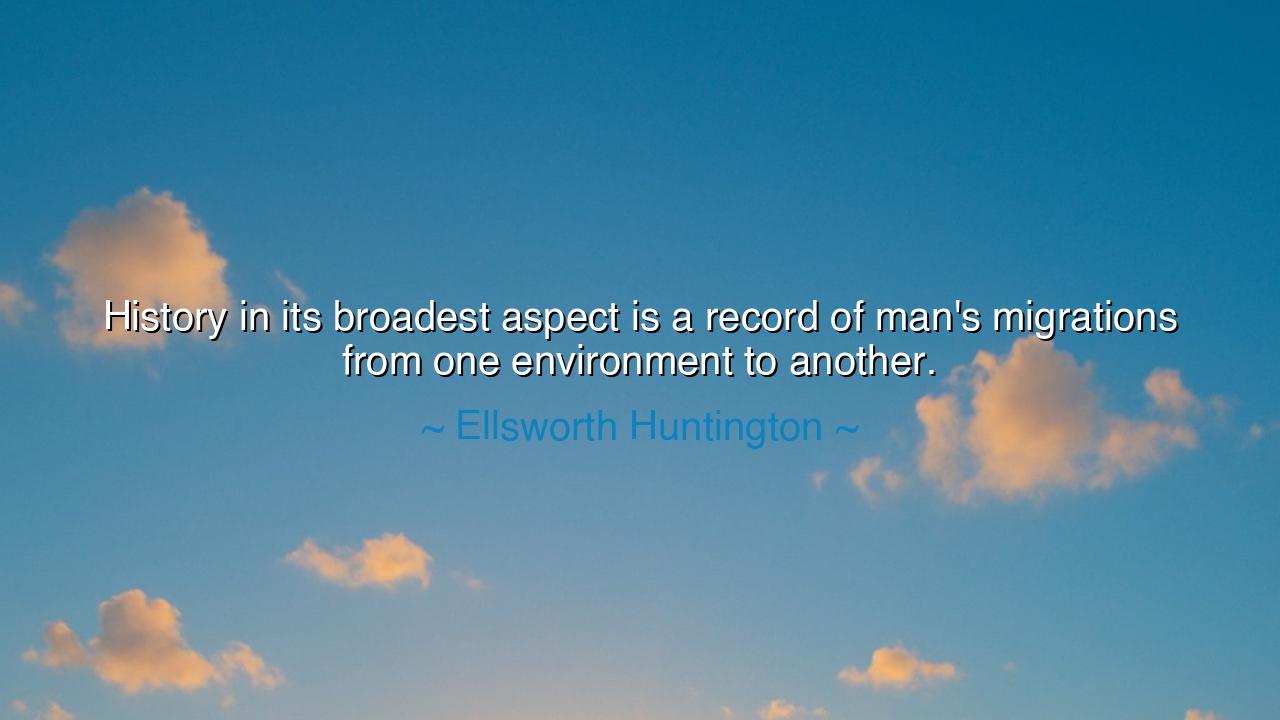
History in its broadest aspect is a record of man's migrations
History in its broadest aspect is a record of man's migrations from one environment to another.






“History in its broadest aspect is a record of man’s migrations from one environment to another.” — Thus spoke Ellsworth Huntington, the geographer and chronicler of civilizations, who sought not merely to record the deeds of men, but to understand the great tides that move them. In this single sentence, he captured a truth as old as humanity itself: that movement — the eternal journey from one place, one condition, one state of being to another — is the pulse of history. Civilizations rise and fall not in stillness, but in motion; peoples are shaped as much by the lands they inhabit as by the dreams that drive them to leave.
To speak of migration is not merely to speak of travel. It is to speak of transformation — of the restless heart of mankind that forever seeks a better world. From the dawn of time, humans have wandered: across deserts and mountains, through forests and seas, chasing food, fleeing storms, following stars. The ancient hunter who left the caves of Africa, the sailor who braved the unknown Pacific, the farmer who crossed the plains to plant a new field — all are threads in the same vast tapestry. And in each journey lies both suffering and creation, for every migration reshapes both the wanderer and the world they touch.
Huntington’s words remind us that the environment — the earth itself, with its climates, rivers, and mountains — is not a silent backdrop to history but an actor within it. The ice ages carved the paths of tribes; droughts scattered kingdoms; fertile valleys gave birth to empires. Consider the Nile River, whose gentle floods birthed Egypt — that shining miracle of ancient time. There, life was organized by the rhythm of the water; religion, art, and power flowed from the river’s steady pulse. Yet when the floods failed, famine came, and the people moved, carrying with them fragments of their civilization. Thus, even the most enduring culture was shaped by migration through environment, compelled by nature’s hand.
We see this truth again in the story of the Mongol tribes. For centuries they wandered the harsh steppes of Asia, their lives molded by wind and grass and horizon. Yet under the banner of Genghis Khan, this movement became destiny. The horsemen of the steppe surged outward, crossing deserts and mountains, uniting East and West in a single breath of conquest. Their empire was not born of cities or cathedrals, but of movement itself — proof that the wandering spirit of humanity can wield as much power as any stone-built throne.
But Huntington’s wisdom is not only about geography; it is also about the inner migration of the soul. Just as the body journeys through the earth, the spirit journeys through life — from ignorance to knowledge, from fear to courage, from comfort to greatness. Each generation must move from the environment it inherits into the one it creates. To remain still is to decay; to move is to live. For history, in its deepest essence, is the story of becoming — of humanity forever crossing from what was into what might be.
There is, too, a warning within his insight. When man forgets his connection to the environment, when he ceases to listen to the whisper of the winds or the cry of the earth, he loses his way. Civilizations that once flourished upon the harmony of nature fell when they sought to master rather than to live within it. The deserts of Mesopotamia, the ruins of the Maya — they stand as monuments not only to time, but to imbalance. Huntington’s studies sought to remind us that progress divorced from nature’s rhythm is but a mirage on shifting sand.
So, my listener, take this lesson: remember that your life, too, is a migration. You move not only through space, but through experience — through trials, through choices, through ages of growth. Be not afraid of movement; embrace it, for it is the breath of existence. Do not resist the winds of change, but learn to sail with them. And as you move, honor the world beneath your feet, for it shapes your path as surely as your will does.
For in the end, history is not a tale of kings and wars, but of journeys — of souls and nations in motion, ever seeking a place where they may endure and flourish. The deserts may shift, the rivers may dry, but still mankind moves onward. Such is our nature, and such is our destiny: to wander, to adapt, to dream — and in that eternal migration, to write the story of the world itself.






AAdministratorAdministrator
Welcome, honored guests. Please leave a comment, we will respond soon